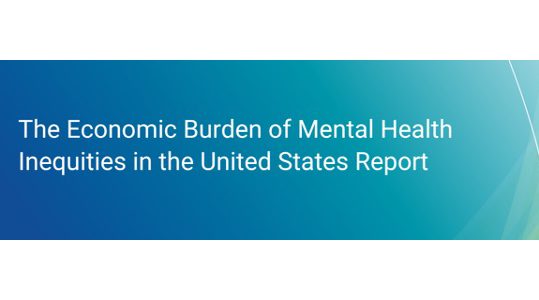New Report: The Economic Burden of Mental Health Inequities
Sep 12, 2022
Today, the Farley Health Policy Center, Satcher Health Leadership Institute, and Robert Graham Center released a first-of-its-kind investigation to examine the economic and health burden of mental health inequities in the United States.
Mental health is critical to wellbeing, but not all Americans have equal access to behavioral health services, such as therapy, medication, and residential treatment. This report examines the impact of mental health inequities on American society by quantifying the potential economic and health savings that an equitable system would provide.
Researchers conducted a comprehensive literature review, analysis of public data sets, and analysis of state and national policies to demonstrate the relationship between economic status, mental health status, and racial and ethnic status. During the five-year study period between 2016 and 2020, they found:
- At least 116,722 premature deaths due to mental and behavioral health-related racial inequities.
- Racial inequities generated at least $278 billion dollars in excess cost burden.
These figures represent national estimates, but they underrepresent the actual burden of mental and behavioral health conditions. Traditional sampling frames and national surveys used for the estimates exclude important groups, including those who live in prison or jail, nursing home residents, residents of assisted living facilities, the unhoused, active military, and people who are institutionalized in psychiatric facilities. Because such populations are rendered invisible in available research, 5.8 million people cannot be taken into account. Analysis of this excluded group reveals nearly $90 billion in additional costs.
This report provides policy proposals, from the very large-scale investments needed, to smaller-scale ideas that can be immediately implemented to address the current and future needs. These include:
- Sustainable and long-term investment in mental and behavioral health infrastructure: developing an equitably trained, funded, and employed workforce of behavioral health providers. Ensuring that behavioral healthcare is accessible to those who need it through insurance coverage, development of a continuum of care sites, and crisis infrastructure such as the new 988 crisis hotline.
- Adoption of culturally centered mental and behavioral health care: individuals need access to care that is person-centered, language-concordant, and culturally appropriate. Policy options also address intersectional and specific populations’ needs from veterans to pregnant people and LGBTQIA+ groups.
- Addressing both the political and social determinants of health: Environmental conditions including the places where people live, learn, work, and play impact health risks and outcomes. Even the current data collection mechanisms fail to take into account many various identities, rendering them invisible. Policy options here would address the systems that create and perpetuate behavioral health inequities.